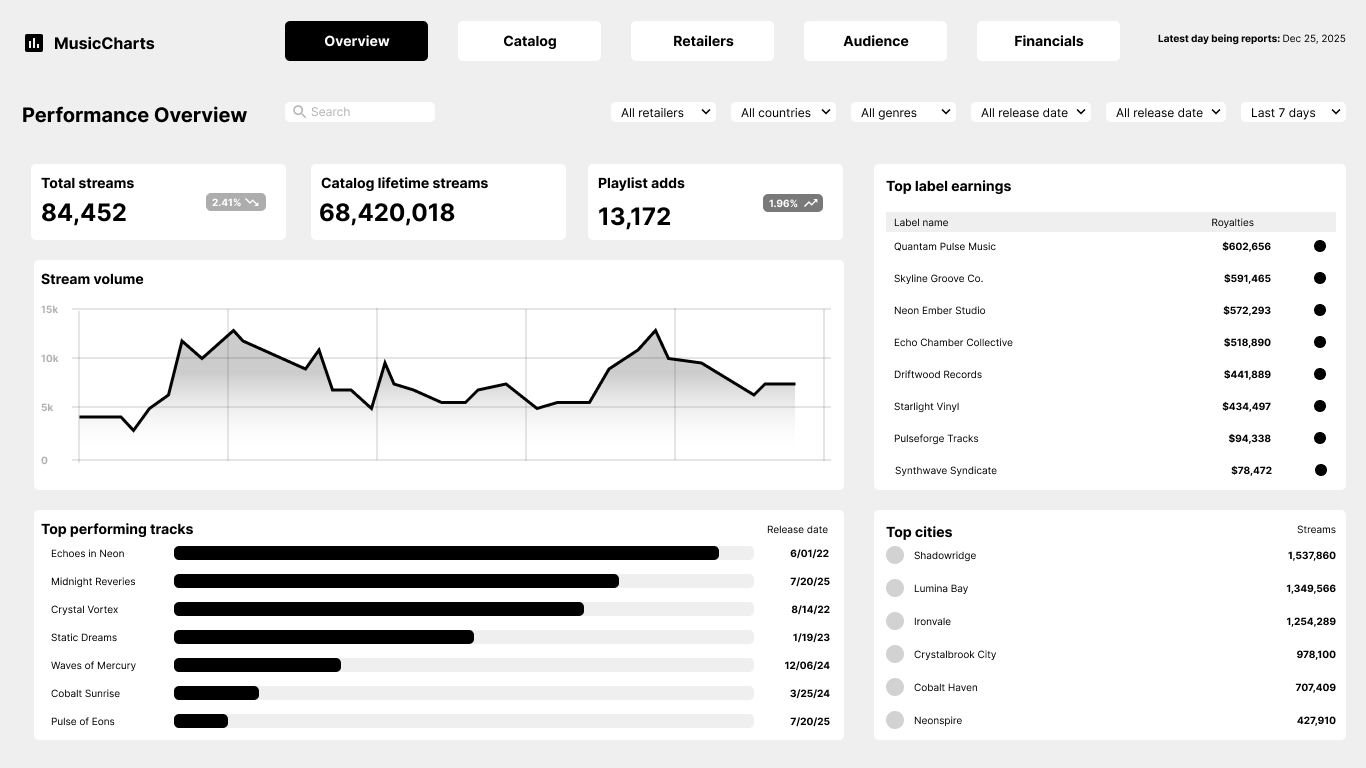
Performance Metrics Dashboard
Real-time analytics platform for music performance tracking
Problem Statement
Empire Distribution, known for launching the careers of artists like Kendrick Lamar and Cardi B, faced a critical turning point in their data operations. Their legacy analytics platform had become a bottleneck, with teams waiting up to an hour for basic report filters to load. Each new user or data ingestion task further degraded system performance, creating a ripple effect across the organization. The challenge wasn't just technical – it was affecting Empire's ability to make timely business decisions and serve their artists effectively.
My Role
As the technical product lead, I stepped into a three-month engagement tasked with modernizing Empire's analytics infrastructure. Working alongside a team of five developers, finance specialists, and project managers, I quickly identified that success would require more than just technical solutions – it demanded a careful balance of innovation and operational stability.
The existing monolithic architecture needed a complete overhaul, but we couldn't disrupt daily operations. I designed a strategy that would introduce modern technology while respecting the complexities of Empire's established workflows. This meant building a React frontend and Ruby on Rails backend that could seamlessly integrate with their legacy systems while laying groundwork for future scalability.
Technical Innovation
We approached the rebuild methodically, focusing on three critical areas. First, we tackled the performance issues by implementing a new data architecture using MongoDB and SQLite. This immediately reduced report generation time from over an hour to under five minutes. Next, we automated the data ingestion process, eliminating the manual intervention that had been consuming valuable team resources.
The most challenging aspect was integrating with multiple streaming platforms while maintaining system performance. We built efficient data mapping workflows for services like Spotify, Apple Music, and YouTube, enhancing Empire's existing trend detection system to provide more actionable insights. The new architecture eliminated the performance degradation issues that had plagued the old system, allowing concurrent users to work without impacting each other.
Key Learnings
The Empire Analytics project reinforced crucial lessons about modernizing legacy systems in fast-moving industries. Building clear boundaries between old and new architectures proved essential for managing complexity, while our standalone component approach enabled rapid testing and iteration. The dramatic performance improvements we achieved came primarily from addressing database bottlenecks early – a reminder that in data-heavy applications, the foundation must be solid before adding features.
Perhaps the most valuable insight was about managing change in established organizations. By involving operational teams early and demonstrating concrete benefits quickly, we built the trust needed to implement broader changes. Starting with core workflows that delivered immediate value helped secure buy-in for more ambitious improvements.
This experience showed that successful technical transformation isn't just about building new systems – it's about understanding how technology, business processes, and people intersect. In the end, creating flexible systems that can evolve with changing needs proved more valuable than pursuing feature completeness from the start.
About this site
This site was built using code assists from Cursor, Claude, and ChatGPT and is currently hosted on Netlify. Prototypes were built using Replit, v0, Bolt, and more.
